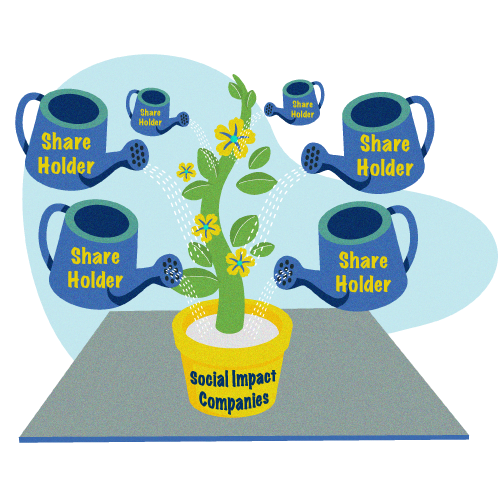Laws on Social Impact Companies

Enterprises or companies of Social impact
Social impact companies are “for profit” companies that work for social or community development. Unlike a Section 8 “non-profit” company in India, social impact companies are those which work to share profits of its promoters / shareholders. Such companies work towards social, cultural, environmental and community development. Some of the major areas are in agriculture, healthcare, education, civic sanitation, housing development, employment, protecting environment and using alternate and renewable energies. These enterprises effectively utilize social media and crowd funding to run their businesses.
While social impact companies have been in existence since early 80’s in the west, the concept gained prominence in India circa 2005-06.
Some key Indian social impact companies impacting society relate to:
- Creating livelihood and employment opportunities in rural areas focusing on rural youth
- Training the differently abled
- Effective medical and health check ups and related facilities for the under privileged
- Creating a platform for connecting blood donors and seekers
- Mutually beneficial relationship between (pet) animals and humans
- Mentoring services to destitute women and youth
- Training in fast extinct Indian ethical crafts and integrating technology with it to provide livelihood to uneducated women in rural areas.
World over there are several social impact enterprises. Few instances are given below:
- A company created platform that monitors storm water using cloud-based software and analyses the volume and inward flow of storm water in certain areas thereby preventing flooding, contamination etc.
- A healthcare NGO that serves as a platform to crowd fund medical care for individuals in developing countries.
- A nongovernment engineering environmental organization is engaged in developing technologies that can be used in eradicating plastic from the oceans.
- A small start-up pioneered the development of a tiny tracking device to track water usage/ consumption and indicates excess or unwanted wastage of water.
- A company has been engaged in designing and creating (patented) products for women which help with hygienic menstruation without resorting to the traditionally used feminine hygienic products.
- There is a software that helps in prediction and prevention of hospitalization of senior citizens.
A look at the Indian and Western enterprises of social impact throws up interesting observations:
- Irrespective of whether a business is for profit or non-profit, the core objective of such companies is the same – change lives and better the society, community and our planet.
- Majority of social entrepreneurs are women. As the new decade begins, it is predicted that women entrepreneurs will be the backbone of the entrepreneurial /social enterprise.
Effective Social impact Laws?
For all the hullabaloo made on such companies in India, they have been hardly any legislations governing their functioning.
Laws relating to Corporate Social Responsibility (CSR) until recently has been indicative laws. Companies reaching certain turnover and profit thresholds were expected to contribute towards social impact initiatives. Besides that, there have been no specific legislations addressing the concerns of social enterprises. The government has decided to plug this loophole.
In the first week of January 2020, the government indicated that it is considering putting in place a new law exclusively governing such social impact companies where profits can be distributed amongst shareholders while ultimately achieving the objective of social and community development. The law would be framed to encourage and facilitate private capital towards such social initiatives.
It has been expressly stated that while Section 8 companies are “not for profit” companies, where no dividend is declared or profits paid to shareholders or promoters, social impact companies would be allowed to declare and pay dividends and also share profits up to certain limit. The regulations would ensure that such companies have the liberty to operate and carry out their business comfortably. Such social impact companies are touted to be a “more evolved version of section 8 companies”. This is social entrepreneurship in all its glory. “Return on investment” and “return to society” rolled into one.

